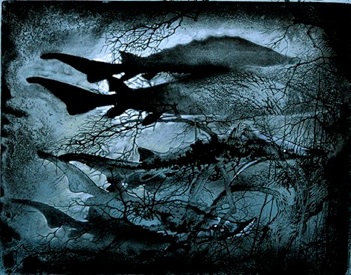|

|
| "Returning of the Sturgeon" by Ladislav Hanka |
Sara Fitzpatrick Comito
The Flea Market Sells Our Sacred Origins from Under Us
How so many antiquities?
How - the dust, so thick,
with what mites and meteors,
a core sample of adorable brevity.
There are bells on the shop door
and it's unpardonable,
the clanging entrance,
the effect on our lungs,
pink darlings, all tender viscera.
The miner sang Clementine
and we don't sing anything
for upsetting the useless teacups
and preposterous liquidation
of human epochs.
Yet we are done in, suffocated
by the rankness of history.
What's the least you will accept?
Sara Fitzpatrick Comito lives in Fort Myers, Florida. She publishes an online journal called Orion headless.
return to top of page
Joaquin Carvel
Stolen Ambulance
Yeah I guess that it sounds awful
and I know it wasn't fair
to our neighbor, Mrs. Faber
who fell down a couple
stairs
but they left the windows open
and the chrome just shone so bright
and they left the motor runnin'
so we tore off through the night
you can blame in on the whiskey
you can blame it on despair
you can blame
it on the voices
of the ghosts who died back there
guess that crazy don't seem crazy
when your thinkin'
gets so hazy
that you take yourself a chance
inside a stolen ambulance
Yeah the cars were pullin' over
every traffic light was green
as we ripped around the corners
spillin' gauze and Benzedrine
so we left
the red lights flashing
and we let those sirens scream
and her mouth was full of sugar
and her eyes were full
of cream
didn't think about direction
kept the pedal to the floor
'til we ran it to a sputter
by the county
reservoir
guess that hopeless looks like wild
when you're busted and defiled
down where all the mayflies
dance
around our stolen ambulance
someone said the destination
ain't important – it's the journey
and I'd say you never done it
'til you tried it on a gurney
yeah we opened up the back doors
and we stared
up at the stars
started talkin' like we used to
smoked a couple cheap cigars
and decided that we'd probably
made our very best mistake
laughin' in the mud and moonlight
rolled that rig into the lake
guess you
gotta spike the sadness
with a night or two of madnesss
and revive a sick romance
inside a stolen ambulance
Joaquin Carvel lives
in Southern California. His work has appeared on bar napkins, the backs of envelopes, and in public bathroom stalls across
three counties. He lays one down every Thursday at his blog, Lyrics & Maladies.
return to top of page
Dane Kuttler
(Untitled)
After we realized
we were not, in fact, immortal,
we went to the diner.
It was 3am,
and the cups were
heavy. We told jokes,
and played hangman
on the paper menus,
pulled up extra chairs
and laughed
like we didn't know
we were supposed
to be quiet and small.
It tasted good.
There were extra tater tots.
The cast of the
Rocky Horror Picture Show
showed up to sit on each others' laps
and order milkshakes.
When the couple
with matching canes
and hand-knitted sweaters
arrived, we all shut up,
as if instructed.
Watched them put
Sinatra on the jukebox,
order two cups
of decaf and a side
of post-coital grinning
and we all breathed -
the fishnet boys and
the big boot girls
and we with work in the morning -
we all thought damn, I hope
it turns out like that.
Dane Kuttler is a Seattle poet who used to be a Massachusetts poet, but has always been a Jewish poet, a bit
of a cranky poet, and a pretty good cook. Her work is generally influenced by her fellow performance poets, and has been
most recently published in Gender Outlaws: The Next Generation (Seal Press 2010) and Learn Then Burn: A Classroom Anthology
(Write Bloody Press 2010) More information about Dane and her work can be found at www.danepoetry.com.
return to top of page
Anna Simmons
I want to be the girl from the songs...
I. …but I’ll
trade for cornbread and cocaine
I am fly-paper: an independent woman,
a codependent piece of honey, attracting
trouble and
surrounded by the Temptations, dead and
old and retired and new, all living and in my bedroom,
twenty-two
falsetto voices
singing me to sleep and offering me
cornbread and cocaine. Does it freak you out
how I began?
Let’s start over, from the refrain.
II. …but
that was a long time ago
I was raised to spill secrets, the youngest of the family,
trained messenger of exasperated
gods,
conditioned to take blame and be shamed,
but they needed me. I was one of
three women, mother and
daughters
idolizing one another in imbalanced secrecy:
Mother rock, girls paper-scissors.
Covering, cutting,
being crushed.
III. …but
I want too much
I wish I could identify
trees. Not flowers, but trees.
There’s a poem I love but
cannot find
nor remember except for how it made me feel—
Sexy, forbidden, lost in words and crossed eyes
and wanting a glass of lemonade
to go with my cornbread I eat with Otis Williams’s
voice licking my earlobe.
IV. …but
I’ll settle for fly genocide
I read in bed to stay awake, as if sleep were
bad for me, as if the fly in
my room will
dare touch me in my sleep, tickle me with its
several legs and wings. It crawls into
my lamp
and I trap it with a book,
which isn’t mine but borrowed,
and the heat from the light bulb leaves
a
pucker in the plastic cover and the fly
has disappeared but the buzz has stopped
too. I contemplate sleeping pills
and diet
pills and ways to compliment a woman
like the Temptations do, but I don’t
deserve such
words except in hallucination,
do I? Do you think I’m beautiful, despite being
a fly-killer? A beauteous
fly-killer. Can you
call me that? Can you make it endearing?
Anna Simmons recently graduated
from Kalamazoo College with a dual degree in Physics and Theatre Arts. Her poetry has been featured most recently in campus
literary magazines, The Caudron and The Passage. Originally from Chicagoland, Anna is currently living in Ann Arbor, where
she is working at a small equity theatre as an apprentice.
return to top of page
Hedy Habra
Adagio for a Forgotten Viola d'Amore
...hyperspace
may provide a means
to tunnel through space and time...
Michio Kaku
In the dark corner
of an abandoned attic
I found a Viola d’amore
leaning against a rocking chair
the only seat that kept my back
straight when pregnant,
mute companion
of long waking hours
It was a chair I thought I’d use
now
that my back aches with age
And how important was this rocking chair
when we lost it all in Beirut?
The chair was in the attic
I visited in my dream
a Viola d’amore leaning over it
its back as straight as the chair’s
a few strings
loose
And topping its long neck
a carved cupid’s head
so
covered with dust
you could never have guessed
it was blindfolded
Does it really matter that no one ever played in the family?
Only what the carved head
overheard whenever pressed
firmly under the chin
of the slender girl
when she was young and strong
not yet my Nonna
sliding
through corridors
in a wheelchair
I wonder how she played then
in the balcony
of our house in Heliopolis
or was it Alexandria?
I can see her pull the flat body
against her chest
each unbowed note
She had a way of walking
that caught the eye
until
she married
at sixteen
to a jeweler freemason
who knew nothing
about music
That’s when she placed her Viola in the attic
next to my rocking chair
Hedy Habra received her MFA and a PhD in Spanish Literature from Western Michigan University.
Her poetry and fiction in French, Spanish and English appear in many journals including Parting Gifts, California Quarterly,
Letras Femeninas, Puerto del Sol, The New York Quarterly, Cider Press Review, Nimrod, Cutthroat & Poet Lore and anthologies
such as Inclined to Speak; Come Together: Imagine Peace; Poetic Voices Without Borders Vol 2 & Dinarzad’s Children
2nd ed. Her critical work appears in reviews such as Explicación de Textos Literarios, Hispanófila, Hispanic Review, Alba
de América, Revista de Estudios Hispánicos, Confluencia, Latin American Literary Review, Chasqui and Inti. www.hedyhabra.com
return to top of page
Raymond Keen
You Can't Explain Goodness
Los primeros gauchos
eran criminales
que se escapaban
de las ciudades.
Goodness is
an outlaw,
always unfashionable,
always a miracle.
Meanwhile,
evil men
evil men
remain organized.
The Devil says
there are
at least two
of everything.
RAYMOND KEEN has recently completed his first volume of poetry, Down In Heaven, Up In Hell, and is attempting
to obtain publication for this volume at the present time. Five of his poems appeared in the July/August 2005 Issue of The
American Poetry Review. One of his poems will be published in the 23rd issue of Breadcrumb Scabs, and another poem will be
published in the September 2010 issue of Pemmican Press.
Although Raymond has had an interest in poetry for many years, his profession has been psychology: Three years as
a Navy Clinical Psychologist with a year in Vietnam (1967-68); the rest as a School Psychologist in the USA and overseas.
Raymond lives with his wife Kemme in Sahuarita, AZ. He has two grown children.
return to top of page
|

